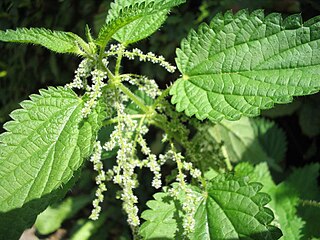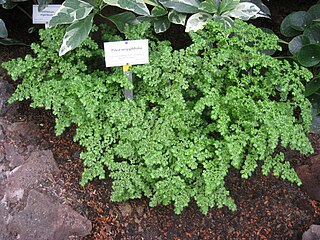
The Urticaceae are a family, the nettle family, of flowering plants. The family name comes from the genus Urtica. The Urticaceae include a number of well-known and useful plants, including nettles in the genus Urtica, ramie, māmaki, and ajlai.

Pilea, with 600–715 species, is the largest genus of flowering plants in the nettle family Urticaceae, and one of the larger genera in the Urticales.
Pilea cataractae is a species of plant in the family Urticaceae. It is endemic to Mauritius. Its natural habitat is subtropical or tropical dry forests.
Pilea jamesonia is a species of plant in the family Urticaceae. It is endemic to Ecuador. Its natural habitat is subtropical or tropical moist montane forests.
Pilea laevicaulis is a species of plant in the family Urticaceae. It is endemic to Mauritius. Its natural habitat is subtropical or tropical dry forests.
Pilea myriophylla is a species of plant in the family Urticaceae. It is endemic to Ecuador. Its natural habitats are subtropical or tropical dry shrubland and subtropical or tropical high-altitude grassland.
Pilea pollicaris is a species of plant in the family Urticaceae. It is endemic to Mauritius. Its natural habitat is subtropical or tropical dry forests.
Pilea riopalenquensis is a species of plant in the family Urticaceae. It is endemic to Ecuador. Its natural habitats are subtropical or tropical moist lowland forests and subtropical or tropical moist montane forests.
Pilea schimpfii is a species of plant in the family Urticaceae. It is endemic to the Chimborazo, Napo, El Oro, and Carchi provences of Ecuador. Its natural habitats are subtropical or tropical moist lowland forests and subtropical or tropical moist montane forests. During the second world war, the only plants in captivity were destroyed in the German herbarium in Berlin, Germany.
Pilea selbyanorum is a species of plant in the family Urticaceae. It is endemic to Ecuador. Its natural habitat is subtropical or tropical moist lowland forests.
Pilea serratifolia is a species of plant in the family Urticaceae. It is endemic to Ecuador. Its natural habitats are subtropical or tropical moist montane forests and subtropical or tropical high-altitude shrubland.
Pilea topensis is a species of plant in the family Urticaceae. It is endemic to Ecuador. Its natural habitat is subtropical or tropical moist montane forests.
Pilea trichosanthes is a species of plant in the family Urticaceae. It is endemic to Ecuador. The natural habitats of Philea trichosanthes are subtropical or tropical moist lowland forests and subtropical or tropical moist montane forests.
Pilea tungurahuae is a species of plant in the family Urticaceae. It is endemic to Ecuador. Its natural habitat is subtropical or tropical moist montane forests.

Pilea microphylla also known as rockweed, artillery plant, gunpowder plant or brilhantina is an annual plant native to Florida, Mexico, the West Indies, and tropical Central and Southern America. In the southern part of México, specifically Campeche and Mérida, the local name is Frescura. The plant belongs to the family Urticaceae. It has light green, almost succulent, stems and tiny 1/8" leaves which contribute to its other nickname, "Artillery Fern", though it is not related to ferns. It is grown as a ground cover in many areas.

Pilea peperomioides, the Chinese money plant or missionary plant, is a species of flowering plant in the nettle family Urticaceae, native to Yunnan and Sichuan provinces in southern China.

Pilea trianthemoides, the artillery plant, is a species of shrubs or subshrubs in the family Urticaceae, native to Florida and the Caribbean islands, where it grows in waste places and moist thickets. It flowers year round.

Pilea mollis is a species of flowering plant in the family Urticaceae. It is used as an ornamental plant, particularly the cultivar 'Moon Valley'.

Pilea glaucophylla, the silver-leaved artillery plant, is a species of flowering plant in the family Urticaceae, native to Colombia.
Pilea elegans is a species in the plant family Urticaceae. It is found in Chile. USDA hardiness zone 9. The plant does not tolerate snow, but can tolerate occasional freezing spells of about -5 degrees C. Light requirements consist of indirect light/low light Can be found in deep ravines in Chile facing south with additional shadow from trees, or where there is a very dense vegetation cover which gives 80 - 100 % shadow







